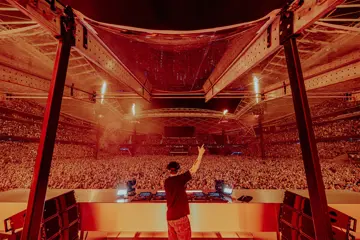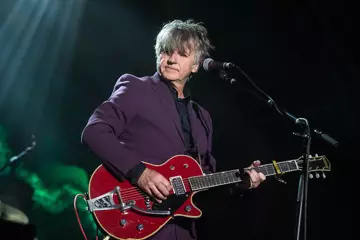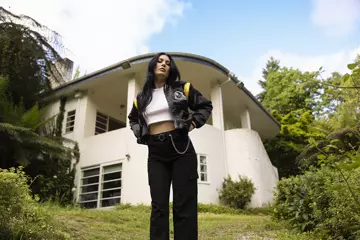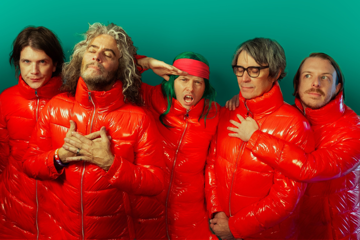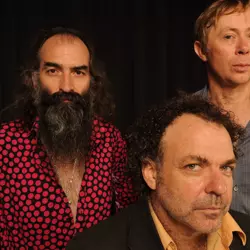 Dirty Three
Dirty ThreeIs this the correct address? A recognisable figure sporting a long-sleeved purple paisley shirt opens a nearby door and leaps out onto the pavement. He wanders towards a metallic purple Ford Falcon, makes a victorious hand gesture (probably celebrating the fact that the windscreen remains parking fine free). Yep, this is definitely the right place.
Warren Ellis is particular about his coffee: “Small cup, long black, room at the top with a splash of cold milk. Like a macchiato but not with hot milk.” Only a few of his shirt buttons serve their function and many chains, including a chunky crucifix, compete for attention on his chest. Ellis also wears a killer pair of black cowboy boots and fondles his longer-than-Catweazle grey beard quite regularly throughout this interview.
Dirty Three's violinist first moved to Melbourne from Ballarat “in '83” and recalls, “I do remember hearing People With Chairs Up Their Noses on a cassette that a guy, he'd been down to Melbourne and recorded it and he was playing that and, you know, cleared the common room at school with it. [That occasion] ended up being the first time I ever heard Jim White [Dirty Three drummer] play – 'cause he was in that band – and then ten years later, yeah, I end up playing in a band with him.” One of the first bands Ellis remembers going to see regularly upon moving to Melbourne is The Birthday Party and he also wound up playing in the bands some of those band members went on to form [Nick Cave & The Bad Seeds, Grinderman]. When it's suggested such circular occurrences are perhaps characteristic of his musical career, Ellis ponders, “I guess so, yeah. I haven't thought about it, but I guess if you work in any field, like, imagine if you were an actor, you know, you bump into similar people along the way and there's points drawn up and if that happens with music – it just happens with life.”
The ink hasn't long set on the announcement that Grinderman have called it a day. “Dirty Three is, you know, it's not like it takes a back seat, but it's like everything,” Ellis shares. “Everything has its moment and I've being doing soundtracks and Bad Seeds and Grinderman and just odd things here and there and [Dirty Three have] been out playing. And it doesn't feel like we'd gone away, but the older you get too it's – when you're young, that's all you do. It's, like, you're out, you tour and that's it and you're in this group and everyone's there. I mean, I've got kids, I've got family and I'm blessed with a very rich musical life and do lots of different things... I'm really happy that we've managed to finally finish a [Dirty Three] record. It's been a while [between records]. If I wasn't working then Jim was out working and, you know, Jim's really busy or Mick [Turner, guitar] would be busy. Mick had a load of kids in the last few years and life just sort of takes over.”
Don't miss a beat with our FREE daily newsletter
One would imagine Ellis often gets asked by bands to compose orchestral/string arrangements, “Well I don't feel like I can walk in very well to projects that are established. And I don't feel what I do is particularly, um, malleable? I think quite often people might like the idea of me going in to work on their [songs], but in reality it sorta doesn't really work,” Ellis muses.
“I mean, I do play on other people's things – occasionally I do stuff – because I know it's really good to kinda branch out and do that. Jim does that a lot; Jim plays the drums for lots of different people and all that. I think I always got a bit superstitious and I felt like I only had a small amount to give and I wanted that to be to a few things as opposed to just throwing it all away.”
The toughest of souls are often reduced to tears at Dirty Three's live shows. Ellis admits “the odd sniffle here and there” is not uncommon to hear. “I think the great thing about playing music is that you get to experience and feel the people's responses to what you're doing,” he continues. “It's one of the few creative mediums, I can't think of another one that has... you do a painting, you go to the opening, but you don't really see how it affects people beyond that. Or you do a film, you go to the screening and you see the people [who are] into it and then that's it! You're not sitting at every screening. But a live show: everyone is different and there's a thing with the audience there and you get that interaction that's very particular to the performing arena and it's really wonderful.”
Nowadays these memories live on and can be shared with others, as can be witnessed by the amount of iPhones held skyward to record the action at any given gig. “A concert can take you to a place that you just never thought you'd go and it's usually something that happens in the moment, when you're there. And you can't be in the moment when you're trying to film it with a bloody iPhone,” Ellis offers. “I don't even know why people bother doing it, to be honest. It's terrible and it all sounds the same; it's all just distorted and stuff. It's just this age we live in when everybody has access to information and everybody wants more information than they need.
“It's a different thing now but, I mean, I used to like going to concerts so that I could kind of just be immersed in it and I didn't wanna be reminded of where I was. And I think once you pull out a camera, then you're reminded of where you are. And, for me, going to concerts and films was always about escaping reality, not about reminding you of reality.
“I actually went to Silencio, David Lynch's club, recently in Paris – he's done a club there and they have a no camera policy. It is fantastic, but there's something kind of annoying about it too. It's like that no smoking rule. Like, I don't smoke but I feel like smoking now that everybody's forced out to the streets to smoke and there's this kind of, you know, this taking away of people's rights, I guess. It was interesting when there's bouncers walking around and telling everybody to stop filming and stuff like that. And for the first time in my life I felt like filming. And David Lynch was standing next to me.”






